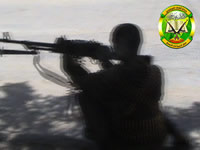|
|
|
Image of a Shabaab fighter from the terror group’s website. |
Three government ministers and two reporters are among 19 Somalis who were killed in a Shabaab suicide attack in the capital of Mogadishu.
The suicide bomber, who was disguised as a woman, detonated his vest in the midst of a graduation for Somali medical students from Banadir University. The ceremony was being held at the Shamo Hotel, one of a handful of locations still under government control in Mogadishu. [See video below for scenes from the attack].
The ministers of health, education, and higher education, along with two reporters from Shabelle and Al Arabia, nine medical students, and a well-known doctor were killed in the blast. Scores more were wounded, including the sports minister.
Shabaab and its predecessor organization, the Islamic Courts, have conducted 19 suicide attacks since September 2006, when the first suicide attack was recorded in Somalia [see list below]. The latest three attacks have focused on senior leaders in the government and the African Union.
The last attack took place on Sept. 17, when suicide bombers penetrated security at an African Union base in Mogadishu and killed 21 people, including the deputy African Union commander and 16 other peacekeepers. One of the suicide bombers was later confirmed to be an American citizen recruited by Shabaab in Minneapolis. State Minister for Defense Sheikh Yusuf Mohammad Siad, who is better known as Indha’adde, sold intelligence to Shabaab that allowed the terror group to conduct the attack.
The June 18 suicide attack outside a hotel in Beletwein killed more than 35 people, including Somalia’s security minister and a former ambassador.
Shabaab, al Qaeda’s affiliate in Somalia, has taken credit for the past attacks.
In late September, Sheikh Hassan Dahir Aweys, the leader of Hizbul Islam, or the Party of Islam, called for more suicide attacks, during a sermon in the town of Elashabiyah just outside Mogadishu. Aweys has close links to al Qaeda and has been listed by the US Treasury Department as a Specially Designated Global Terrorist.
Although Aweys and Hizbul Islam have been allied with Shabaab, the two groups have recently clashed over control of Kismayo and other towns in the South. The battles have resulted in the Shabaab takeover of much of southern Somalia. Some Hizbul Islam groups have defected to Shabaab, while some others have joined the government.
Both Shabaab and Hizbul Islam have been relentless in attacking African Union peacekeepers and Somali government forces stationed in the capital of Mogadishu. At present, the government and AMISOM control only a few enclaves in the city.
Outside of Mogadishu, the central government wields little control. Shabaab and Hizbul Islam currently control almost all of the southern and many of the central provinces of Lower Jubba, Middle Jubba, Lower Shabelle, Gedo, Bay, and Bakool.
The central Somali districts of Middle Shabelle, Hiran, and Galgadud are considered contested, with the government and allied Islamist groups in nominal control of some areas.
Not only do Shabaab and Hizbul Islam reject the African Union presence in Somalia, the groups also reject President Sharif and his faction of the Alliance for the Re-Liberation of Somalia – Djibouti for reconciling with the Somali government. From 2006 until early 2007, Sharif was the co-leader of the now-defunct Islamic Courts Union with Aweys.
Suicide attacks in Somalia since September 2006:
Dec. 3, 2009: A Shabaab suicide bomber dressed as a woman detonated his vest at a graduation ceremony for medical students at a hotel in Mogadishu and killed 19 people, including the ministers of health, education, and higher education, and two reporters.
Sept. 17, 2009: Shabaab suicide bombers penetrated security at an African Union base in Mogadishu and killed 21 people, including the deputy African Union commander and 16 other peacekeepers.
June 18, 2009: A Shabaab suicide bomber killed the security minister and a former ambassador during an attack outside a hotel in Beletwein that killed more than 35 people.
May 24, 2009: A Shabaab suicide bomber killed six policemen and a civilian in an attack on a police station in Mogadishu.
Feb. 22, 2009: Shabaab claimed to have conducted a dual suicide attack on Burundi troops in Mogadishu; the African Union claimed the attack was a mortar strike.
Oct. 29, 2008: Five suicide bombers struck four compounds in the semi-autonomous regions of Somaliland and Puntland, killing 28 and wounding scores more. Three suicide car bombers struck the presidential palace, the UN Development Program compound, and the Ethiopian Consulate in the city of Hargeisa in Somaliland. Two bombers targeted an intelligence facility in the city of Bosasso in Puntland.
April 8, 2008: A Shabaab suicide bomber rammed a car into the gate of the complex that housed peacekeepers from Burundi; one soldier was killed.
Oct. 11, 2007: A suicide bomber killed three Ethiopian soldiers near a base in Baidoa where the Prime Minister was visiting.
June 4, 2007: A suicide car bomber attacked the Somali Prime Minister’s home; seven were killed. Another suicide car bomb was detonated near an Ethiopian Army base.
April 25, 2007: A suicide bomber killed 11 during an attack on a hotel south of Mogadishu.
April 20, 2007: A suicide car bomber attacked an Ethiopian army base in the capital.
Nov. 30, 2006: A suicide bomber killed eight in an attack in Baidoa.
Sept. 18, 2006: In the first recorded suicide attack in Somalia, one or two suicide bombers attacked the convoy of the president of the Transitional Federal Government as he was heading to speak to parliament in Baidoa; six Somalis were killed.
Video of today’s suicide attack. Warning, the video is very graphic.









1 Comment
“The suicide bomber, who was disguised as a woman, detonated his vest in the midst of a graduation for Somali medical students from Banadir University.”
Speaks volumes to the evil of our enemy.